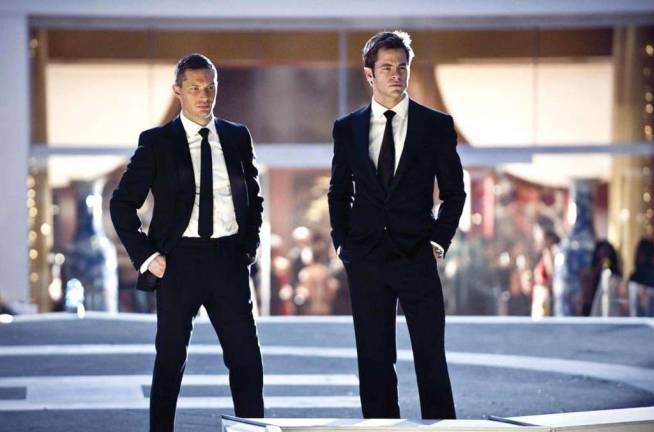Tiresome Threesome

In the stultifying Tinker Tailor Soldier Spy, British actor Tom Hardy briefly appeared in a romantic subplot as a heartbroken, repentant operative who laments all the impenetrable death and subterfuge simply because it cost him the woman he loved. For a few fleeting moments, Hardy's alert eyes, sensual lips and magnetic ruddiness broke through film's tedium, making the story clear and accessible-then his character receded, sinking back into the middle-brow muddle.
For different reasons, Hardy's youthful blush is also wasted in the new knockabout spy comedy This Means War, where Hardy plays the loser in the film's ménage a trois with Chris Pine and Reese Witherspoon.
CIA agents Tuck (Hardy) and FDR (Pine) vie for products executive Lauren (Witherspoon)-they dodge bullets, make passes at the woman and threat/passes at each other in a pointless, meant-to-be-funny sexual competition. This latent homoeroticism is livelier than in Tinker Tailor, yet is so persistently unfulfilled that it feels both mistaken and misdirected.
The film's uncommitted approach to the battle of the sexes and gender confusion has as little to do with current sexual habits as Tinker Tailor does with contemporary politics; it's a lowbrow version of Tinker Tailor's skepticism about government pushed toward cynical manipulation of today's baffling romantic impulses.
Here's Hardy, a genuinely charismatic movie actor in a period where the incumbent George Clooney runs on an outmoded, blatantly insincere platform of smarminess, stuck in the teasing outsider position of a love triangle. That Tuck loses Lauren to Pine's FDR (FDR?!) settles for a blandness that goes against movie-watching instinct.
The film doesn't have the subtlety or finesse to successfully maneuver action comedy, screwball romance or bisexuality. Just when you expect the threat of danger to edge the film toward the risqué, it stays banally far outside it. Director McG takes none of it seriously, which is a disappointment, given that his two previous films, Terminator Salvation and We Are Marshall, indicated McG was outgrowing the adolescent puppyishness of his two Charlie's Angels retreads.
It must be commercial desperation that makes McG hit every note here so tunelessly hard; he can't even juggle the physical humor of shootouts, skydiving and mano-a-mano one-upmanship. If McG could have aced the assignment and found a method of slapstick eroticism, This Means War might have made sense of its raunchy and reckless view that combines global political problems (post-9/11 romantic disillusionment) with the anxiety of personal commitment. Instead, it's as bonkers as Brangelina's Mr. and Mrs. Smith.
If Tinker Tailor suggested a Bourne movie directed by Béla Tarr, This Means War suggests one of the stars of Jackass directing a Valentine's Day chick flick while lying in traction. I would have expected McG, of all directors, to come up with a romantic comedy version of the Jackass movies; Hardy and Pine supply enough comic virility (Witherspoon, alas, is superfluous and performs anxiously).
The entire overbright, overbearing production is already outdone by a viral promotional clip of McG and Hardy dropping their pants to become paintball targets. That clip is funnier and more authentically boyish than anything in the film's arrested adolescent assumption that anyone wants to see two guys persistently go after the same woman while fighting Eurotrash terrorists and dodging the ire of their angry boss (Angela Bassett).
This Means War runs along three separate tracks that never successfully converge; it's just off the rails. Hardy's waiting-in-the-wings movie-star charisma seems not only underutilized but misunderstood.
Follow Armond White on Twitter @3xchair.